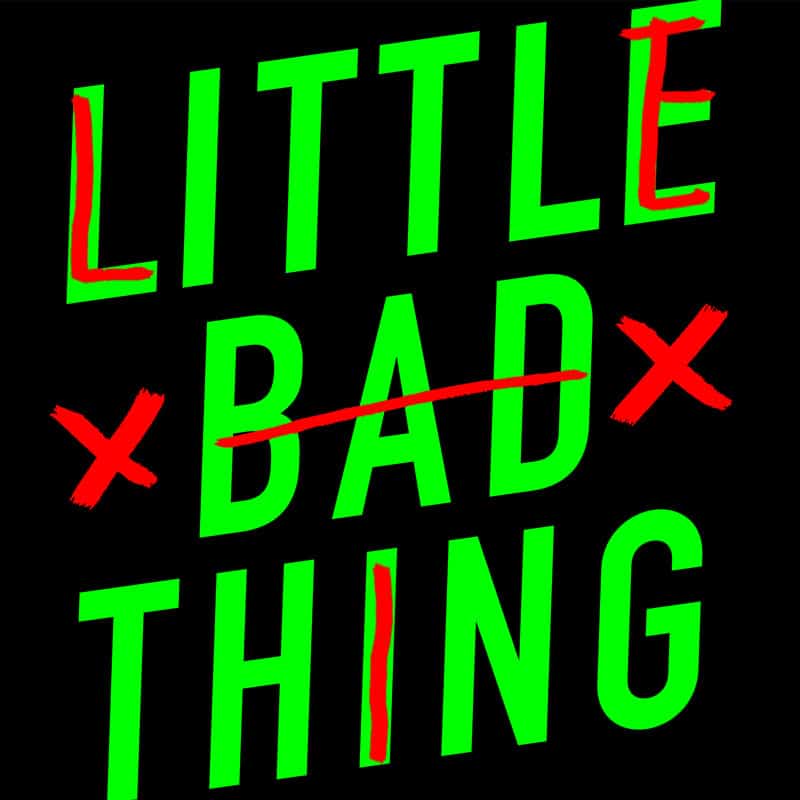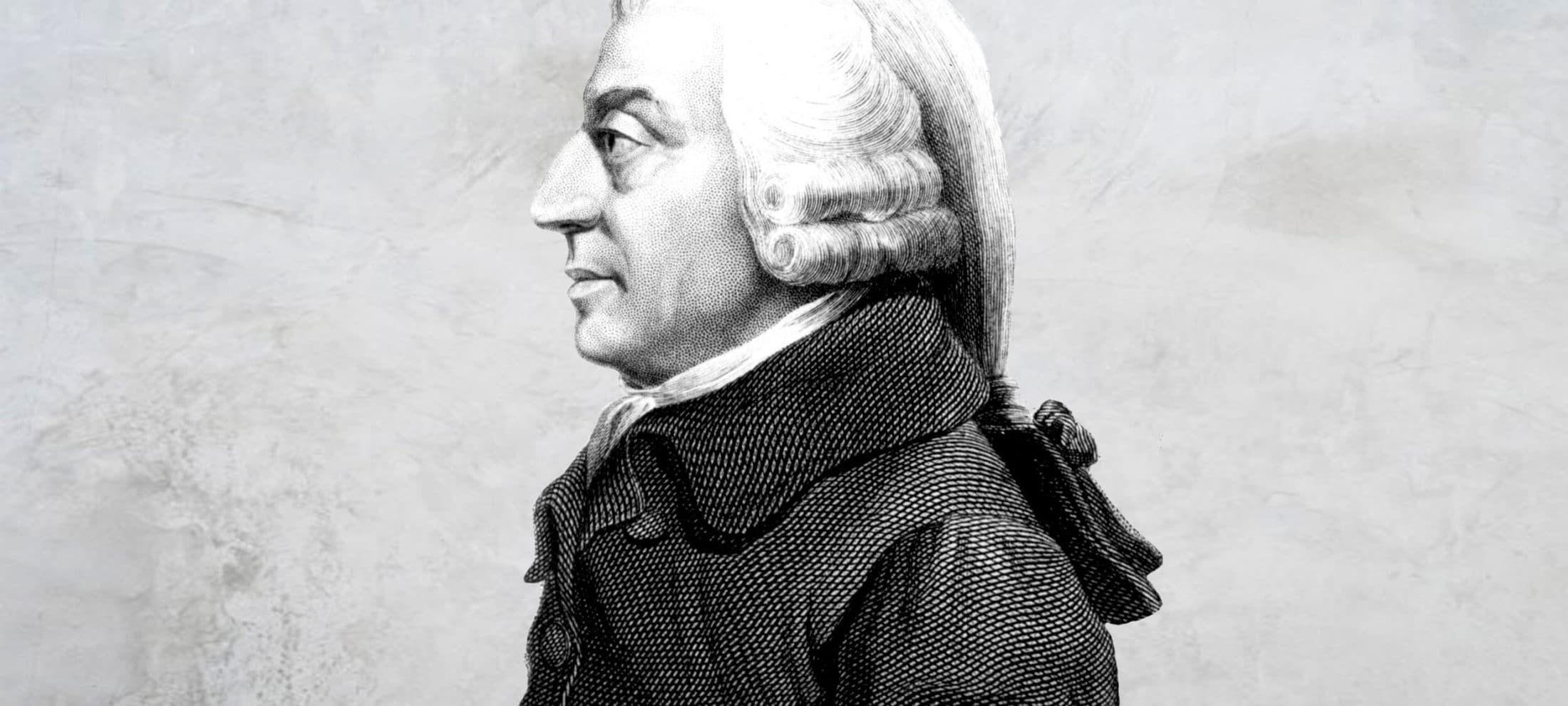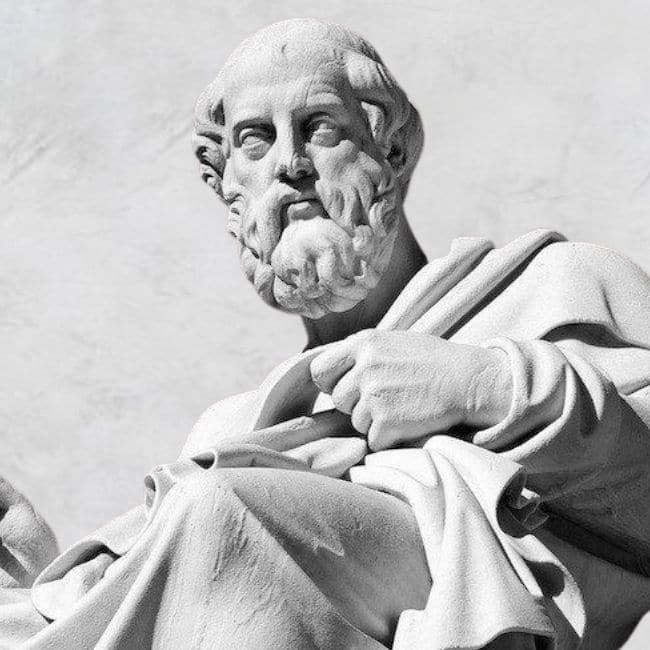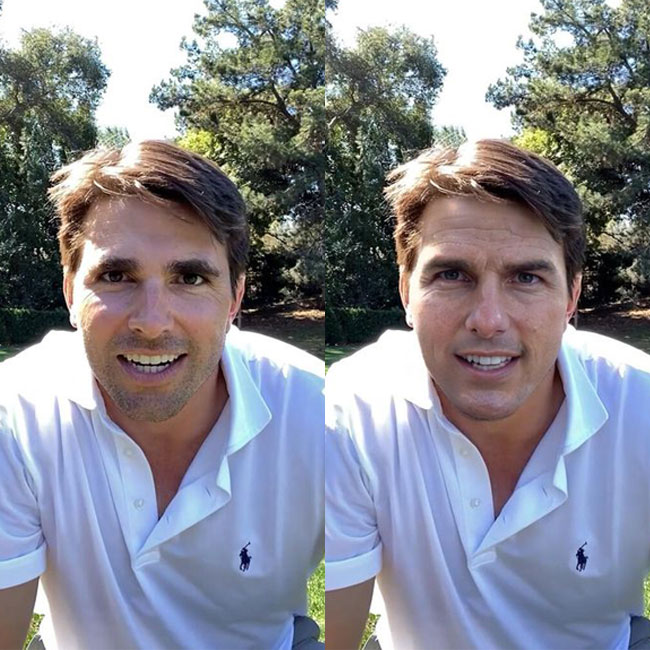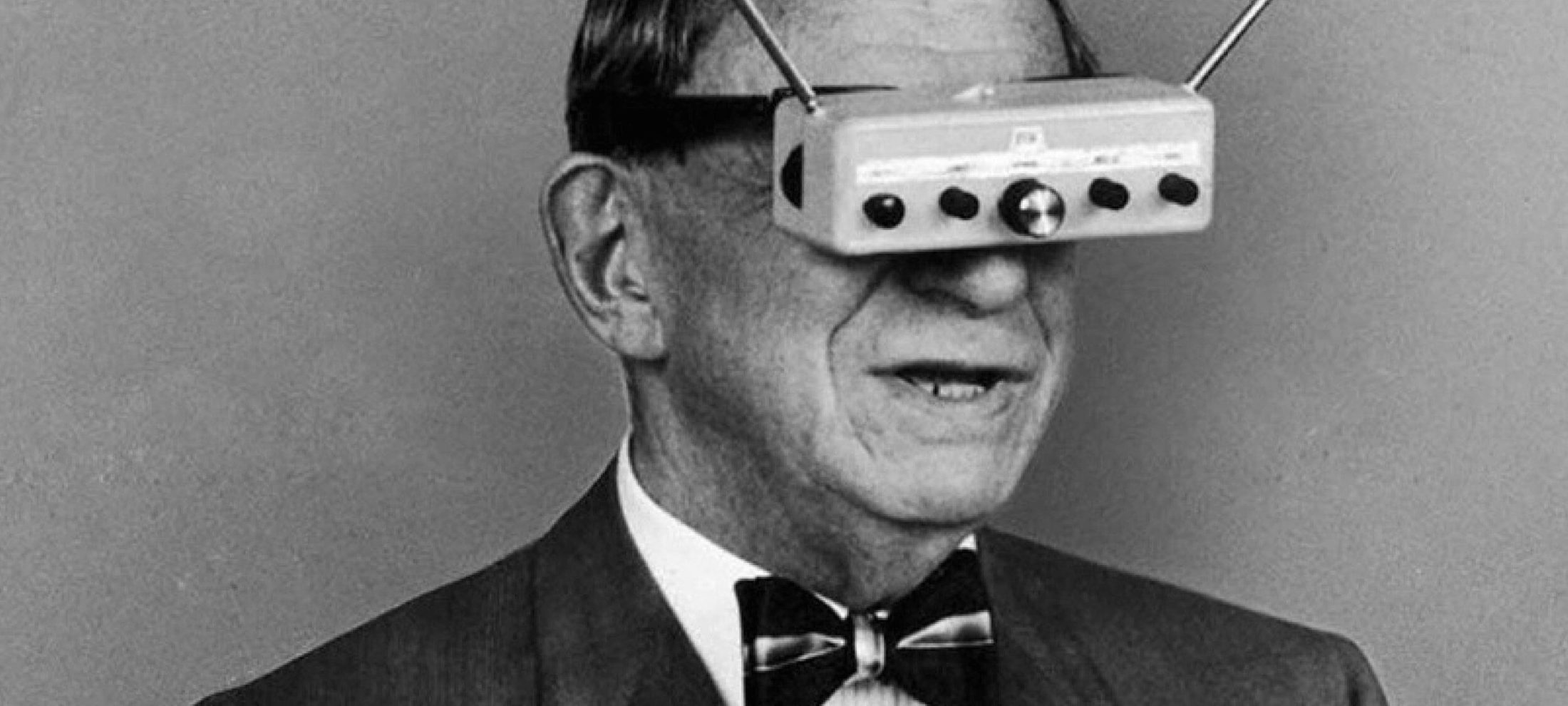A parade of vices: Which Succession horror story are you?

A parade of vices: Which Succession horror story are you?
Opinion + AnalysisRelationshipsSociety + Culture
BY Joseph Earp 20 DEC 2021
There is a singular thrill that comes from watching very bad people do very bad things.
The anti-hero has been a staple of modern television and cinema for decades, made popular by Tony Soprano splashing about in a swimming pool with a brace of ducks, taking some much needed “me time” after overseeing a truly astonishing number of murders.
This kind of art might have some therapeutic aspects – it teaches us how not to be, so we might learn how to be – but that’s not its purpose. Its purpose is entertainment, the sick, giddy feeling that comes over us when we watch people throw off the entirely artificial rules of morality, and behave however they want.
Moreover, this kind of art is a way of teaching us the manners by which our moral outlooks are shaped by repetition: habit and practice. When we see someone like Soprano do the same evil things, over and over again, we learn about the compounding nature of vice, the way that one bad action spawns a myriad of others.
No show exemplifies that thrill better than Succession. Its characters are vicious, and in both meanings of the term: each week, they tear each other apart, sacrificing even familial bonds for the sake of victories that almost immediately sour in their mouths. They live in a world that is constantly in the process of ratifying, and, briefly, rewarding them; they are shaped by their wealth, and by the uneasy collective they form with each other, in which power is everything and weakness is to be avoided at all costs.
But this gaggle of do-badders are not alike in their foibles. Each principal member of the cast displays a different vice, and has a different way of working towards the same unpleasant ends. Here is a kind of “pick your horror” list of the show’s central players, outlining each of their worst qualities. Which deviant are you?
Logan Roy: The Happy Capitalist

As Peter Singer noted, capitalism thrives on individuation; the idea that we are made up of communities of one, and that it is always better to sacrifice the well-being of others in order to get ahead. And how better to sum up that belief that you should, at all times, consider yourself the number one priority than the behaviour of Logan Roy? Logan has no loyalty – he will hurt whoever he needs to hurt. He is one of the few purely, uncomplicatedly immoral characters of the show, being openly unremorseful. He is, as Aristotle would put it, in total vicious alignment – he feels no urge to do the right thing, and his behaviours line up perfectly with his moral universe, of which he is the centre.
Kendall Roy: The Coward
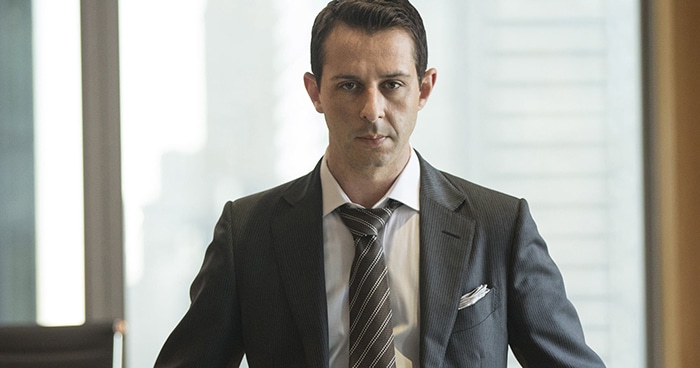
Speaking of alignment, the character in Succession whose behaviours are most out-of-sync with their desires is Kendall Roy. Unlike Logan, he is not without remorse. Time and time again, he repents – one of the most affecting moments of the recent season was the man on his hands and knees, saying, in a voice of exhaustion, that he has tried. He suffers from a tension that we all feel, one between moral behaviour and immoral behaviour. He wants to be courageous – that is how he sees himself. But his base level desires, many of which he hasn’t even analysed within himself, are in constant conflict with the globalised outlook he has on his moral character. There is a gulf between how he considers himself in the abstract, and how he actually acts, moment by moment.
The problem, in essence, is that Kendall moves too fast. His decisions come too quick, and they are guided by his misplaced desires to appease his father and to feed into the pre-existing drama of the family. Iris Murdoch once wrote that we should train ourselves to live a moral life, habituating good action so we can unthinkingly help others when the time comes. When the time comes for Kendall, as it does with insistent regularity, he unthinkingly makes the wrong choice, sacrificing his own systems of values to appease a man who considers him less than dirt. That’s cowardice in its purest form.
Roman Roy: The Casually Cruel

When we think of evil, we tend to imagine oversized portraits of crooked megalomaniacs, stealing candy from babies and kicking the backsides of puppies. But as philosopher Hannah Arendt tells us, evil need not be enacted by larger-than-life villains. Indeed, Arendt believed that vicious behaviour can be performed in a myriad of tiny ways by the most unassuming of individuals. That is Roman Roy to a tee.
Through the series, Roman appears to be nothing more than a happy-go-lucky hedonist, a man filled to the brim with pleasures, who enjoys the finer things in life. But that happiness also extends to the vicious behaviour of himself and of others. He loves suffering and rejoices in the chaos of his family life. His horrors are pulled off with a smiling face, as though they are nothing but briefly disarming attractions, as inconsequential as a county fair.
Shiv Roy: The Manipulator

It was Immanuel Kant who once wrote that we should always treat those around us as ends in themselves, never as means. Kant thought it one of the great immoralities capable of being enacted by human beings for us to see those around us tools, whose internal lives we need never to consider. After all, for Kant, human beings are the creators of value – there is no goodness intrinsic in the world, and it exists only in the eye of the beholder. Try telling that to Shiv Roy. Shiv sees those around her as mere means of getting what she wants, to be used and discarded on a whim – even her husband is one more bridge to be shockingly burnt after she has crossed it.
Not that Shiv is without redemption. Kant also believed that there is always good will: an iron-wrought and rational understanding of the correct thing to do in any moral situation. His was a virtue ethics founded on principles, and Shiv does, despite herself, have those. Take, for instance, her complicated introduction to the world of politics in season three. She is offered what Peter Singer would call the ultimate choice – the option of winning the race against her siblings for her father’s affections, if she endorses a particularly slimy Republican candidate for President. There are, to our surprise – and maybe even to hers – lines that Shiv will not cross. Turns out even the most manipulative of us can find there are things that we simply will not do.
Cousin Greg: The False Innocent
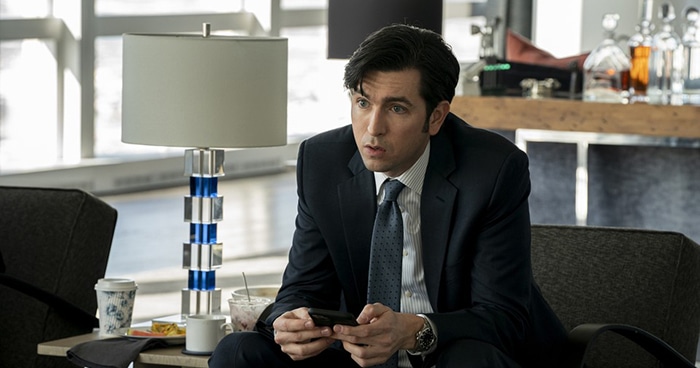
Innocence can have an intrinsic value: it can be good for itself, in itself. But Cousin Greg, Succession’s scheming dope, uses his innocence instrumentally. He presents himself as being the dumbest person in the room, forever in the process of duping others with his blandness. But there is nothing innocent to the way he acts.
His is a vice that comes from its very duplicitousness – he presents himself one way, as though he never quite understands the situation, and then acts very differently in another. It’s proof, if any more was needed, that virtues can be a disguise that we can drape ourselves in the illusion of good behaviour, for nothing but our own benefit.
Tom Wambsgans: The Sycophant
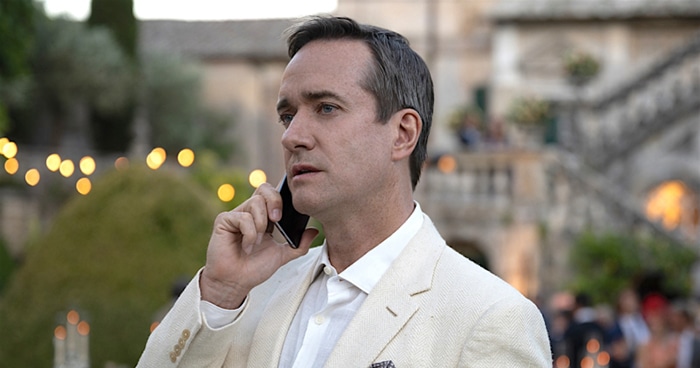
Loyalty is a morally neutral character trait. It can be virtuous, as when we are loyal to our friends, and it can be vicious, as when we unbendingly act in accordance with an evil benefactor. Tom Wambsgans started Succession as one more foot soldier, a buffoon kicked around by forces much greater than him: no wonder he found a twisted kind of kinship with Cousin Greg, another duplicitous fool. But his loyalty to Logan – his unwavering belief that the sole purpose of his life was to be in the good books of the elder Roy – eventually transformed him into something much more nefarious.
Tom is unwavering in his belief system, utterly obsessed with power, and firmly of the opinion, contra to the writings of Michel Foucault, that it only moves in one direction. Tom wants total power, and he wants it totally. He does not consider, as Foucault did, that the person over whom we hold power also holds power over us. If all of history is a boot stomping on a human face, then that’s Logan’s spit-shined boot, and Tom’s smugly smiling face.
Ethics in your inbox.
Get the latest inspiration, intelligence, events & more.
By signing up you agree to our privacy policy
You might be interested in…
LISTEN
Relationships, Society + Culture
Little Bad Thing
Explainer
Relationships
Ethics Explainer: Vulnerability
Opinion + Analysis
Relationships
Our desire for reality: What OnlyFans says about sexual fantasy
Explainer
Relationships
Ethics Explainer: Ethical judgement and moral intuition
BY Joseph Earp
Joseph Earp is a poet, journalist and philosophy student. He is currently undertaking his PhD at the University of Sydney, studying the work of David Hume.
Of what does the machine dream? The Wire and collectivism

Of what does the machine dream? The Wire and collectivism
Opinion + AnalysisPolitics + Human RightsRelationshipsSociety + Culture
BY Joseph Earp 10 DEC 2021
This week, a group of more than a dozen Rohingya refugees launched a civil suit against Facebook, alleging that the social media giant was responsible for spreading hate speech.
The victims of an ongoing military crackdown in Myanmar, the refugees claimed not merely that Facebook allowed users to express their anti-Rohingya views, but that Facebook radicalised users – that, in essence, the platform changed beliefs, rather than merely providing a conduit to express them.
The suit is, in many ways, the first of a kind. It targets the manner in which systems – whether they be social media giants, video streaming sites like YouTube, or the myriad of bureaucracies that we all engage with in one way or another almost every day – warp and change beliefs.
But what if the suit underestimates the power of these systems? What if it’s not merely that social and financial enterprises alter beliefs, but that these enterprises have belief sets entirely of their own? More and more, as capitalism continues to ratify itself, we are finding ourselves swept up in communities that operate on the basis of desires that are distinct from the views of any one member of those communities. We are all part of a great, groaning machinery – and it doesn’t want what we want.
Pawns in a Game
There is a key sequence in David Simon’s critically adored television series The Wire that sums up this perspective perfectly. In it, three young men, all of them members of a rickety enterprise of crime, find themselves playing chess. The least experienced man does not understand the game – how, he wants to know, does he get to become the king? He doesn’t, the most experienced man explains. Everyone is who they are.
Still, the younger man wants to know, what about the pawns? Surely when they reach the other side of the board, and get swapped out for queens, they have made it – they have beat the system. No, the experienced man explains. “The pawns get capped quick,” he says, simply.
There is a deep, sad irony to the scene: the three men are all pawns. They have no way of beating the system. They will not even live to become queens. When one of them dies a few episodes later, shot to death by his friend, there is a grim finality to the murder. He did, as expected, get capped quick.
This is the focus of The Wire – the observation that members of any community are expendable when weighed against the desires of that community. The game of chess is bigger than any of the pawns could imagine, a system with its own rules that they are merely contingent parts of. And so it goes with the business of crime.
Not only crime, either. The genius of The Wire is the way that it draws parallels between those who operate outside the law, and those who uphold it. The cops who spend the series cracking down on the drug trade are also pawns, in their way: lowly members of a system that they are utterly unable to change. No matter what side of the law that you fall on, you will find yourself submerged in bureaucracy, The Wire says – in the machinations of a vast system of power relations with a goal to constantly perpetuate itself, at your expense.
These are the systems that Sigmund Freud wrote of in his seminal work, Civilization and Its Discontents. For Freud, there is an essential disconnect between the desires of individuals and the desires of the social communities that they unwillingly become a part of. There are things at foot that are bigger than any of us.
Bureaucracies are not the sum total of the desires and beliefs of the members of those bureaucracies. These systems have a life – a value set – entirely of their own.

The Game Never Changes
If that is the case, then how does change occur? The Wire offers only dispiriting answers. The show’s idealists – renegade cop Jimmy McNulty, rogue crime boss Omar Little – either find themselves subsumed by the system that lords over them or eliminated. There is a hopelessness to their rebellion. They uselessly throw themselves into the path of a giant piece of machinery, hoping that their mangled bodies slow the inevitable march of progress.
It doesn’t work. Those who thrive are those who give themselves over entirely to the system, who align their values perfectly with the values of their community and embrace their own insignificance. Snoop, the show’s most hideous and intimidating villain, is a happy pawn, one who has never once considered changing the rules of the game that will send her too into an early, dismal grave.
But what if we all stop playing? That is the solution that The Wire never considers. If these systems, whether they be criminal or judicial, are to be changed, then it requires a different kind of collectivism. We are all part of many communities, not just one. If we remember this – if we understand that we have the power and solidarity that comes from being a member of a particular class, a particular race, a particular gender – then we can fight collective power with collective power. The solution isn’t to get the pawn to the other side of the board. It’s to tip the board over.
Ethics in your inbox.
Get the latest inspiration, intelligence, events & more.
By signing up you agree to our privacy policy
You might be interested in…
Opinion + Analysis
Health + Wellbeing, Relationships, Science + Technology
Periods and vaccines: Teaching women to listen to their bodies
Opinion + Analysis
Relationships
The ethics of friendships: Are our values reflected in the people we spend time with?
Explainer
Politics + Human Rights, Relationships
Ethics Explainer: The Harm Principle
Opinion + Analysis
Politics + Human Rights
Australia Day and #changethedate – a tale of two truths
BY Joseph Earp
Joseph Earp is a poet, journalist and philosophy student. He is currently undertaking his PhD at the University of Sydney, studying the work of David Hume.
The self and the other: Squid Game's ultimate choice

The self and the other: Squid Game’s ultimate choice
Opinion + AnalysisRelationshipsSociety + Culture
BY Joseph Earp 25 NOV 2021
In the world of Netflix’s smash hit Squid Game, a collection of desperate people must make a terrible choice: they can either keep living their lives, which are filled with debt and suffering, or they can submit to the titular competition, a series of contests based on children’s games. If they win these contests, their debts will be absolved. If they lose, they will die.
*Spoiler warning for Squid Game
The Australian philosopher Peter Singer would call this an “ultimate choice.” Although on the surface, it is a decision as to whether or not to live with debt, in a much deeper sense, it’s a decision about how to live. The very foundational beliefs of Squid Game’s frantic characters are being challenged. What matters to these people? What do they want out of life? And, just as importantly, how far will they go to get it?
The State of Nature
Squid Game depicts a world of pure barbarism: guided by their desperation, its characters form alliances only when it is mutually beneficial to them, and are often as quick to betray one another. In episode three, for instance, Sang-woo uses insider knowledge of the next contest to get himself ahead, concealing from his supposed allies that he is already aware of what is about to occur.
True acts of kindness sometimes flash through like fish glimpsed at the bottom of a river – consider Hwang Jun-ho, whose participation in the world of Squid Game is guided by the love of his brother – but such moments of empathy are few and far between.
The depiction of such a blood-thirsty, self-interested world is one the philosopher Thomas Hobbes played upon in his construction of the “state of nature.” According to Hobbes, human beings who exist in this state live in a way that is “nasty, brutish, and short.” In such a primal state, one without government, there is no centralised means of understanding or enforcing what is right and wrong, and self-interest is the name of the game.
“So long a man is in the condition of mere nature, (which is a condition of war,)” Hobbes wrote, “private appetite is the measure of good and evil.”
Hobbes believed that the only way to avoid this state of nature was to submit to a governing force – to hand oneself over to a power that could create and enforce a set of rules, known as the social contract. The world of Squid Game contains such a governing force, the shadowy world of the VIPs, who run the games for their own amusement.
But rather than guiding the games’ participants out of the state of nature, the VIPs further deepen and enforce it. The rules that they develop are explicitly designed to keep the desperate players in a world of confusion and barbarism, where self-interest is rewarded, and chaos is the name of the game. The lives of the participants are nasty, brutish, and short, and their spurning of ethics in favour of desperate attempts to get ahead is actively rewarded by a system that runs, above all else, on violence.

The suspension of the moral code
This system, vicious as it is, pushes ordinary people to extraordinary lengths. The characters of Squid Game are, for the most part, simply and vividly drawn – they are defined above all else by their desire to absolve their debts and live freely. That one desire is all it takes for them to suspend the usual moral code that most of us live by, and to act in frequently horrific ways.
Even Sang-Woo, one of the more honorable characters in the show, ends up making deeply immoral choices, culminating in his decision to hurl the glassmaker off a platform in a final act of desperation. He has no stable set of ethics – his code is shaped by a system that thrives on horror and pushes human beings to consider their fellow brethren as little more than tools to be used and discarded at whim.
In this way, Squid Game offers a gleefully cruel riposte to the notion of virtue ethics. Its characters do not act in consistent, moral ways, as virtue ethics imagines that agents do. Although it takes a combination of financial ruin and a system deliberately designed to sow mistrust and horror for them to abandon their usual moral principles, it still brings up some uncomfortable questions about how easily we might abandon our ethics in the real world.
With a kind of horrifying elegance, the show also reveals just how fragile our notion of solidarity can be. We might want to believe that there are bonds between ourselves and even total strangers that cannot be broken – a kind of communal well-spring of trust that stops abject violence from breaking out. But dangle the mere proposition of a debt-free life in front of people willing to do anything to save themselves and their families, and this sense of community breaks horribly down. The show’s participants are alienated not only from their own moral code, but from each other. They are strangers in the deepest sense of the term, the simple, child-like games of the show’s title obliterating any sense of shared humanity.
But can these participants be blamed for their actions? Derek Parfit, the English philosopher, would argue not. It was he who developed the notion of “blameless immorality”, conditions under which people can be forced into vicious actions for which they are not culpable. The heroes of Squid Game are propping up a system that perpetuates further horror, certainly, but their autonomy has been radically diminished. They are little more than puppets, guided by powers outside of their control, their actions no longer their own.

Ethics Versus Self-Interest: The False Choice
Squid Game rests on the principle that self-interest and ethics are at loggerheads with one another – that choosing to do good for others leads necessarily to a sacrifice for oneself. Yet, it’s worth analysing this supposed dichotomy between self-interest and a good, ethical life.
Certainly, the notion that helping others requires us to sacrifice something for ourselves is an old, pervasive myth – it’s why we can view do-gooders as suckers, wasting time on the help of others instead of getting ahead. As Singer notes, such a view was particularly prevalent in the ‘80s with the rise of Wall Street, a world where duping the market – and even your supposed friends – had considerable benefits.
Act immorally – lie, cheat and steal – and you too could become a power player, with more wealth than you dreamed of.
But is there really such a distinction between being self-interested and acting ethically? Could it not be that this is merely an old capitalist myth, designed to perpetuate a system that thrives on “othering” and isolation? After all, viewing our interests as separate from those around us requires us to believe that we are sealed off from the social world, that there is some kind of line to be drawn between behaviours that are meaningfully “ours” and those that belong to others.
In actual fact, it is worth moving away from such an individualist notion of the self, and towards a more communal one. As it happens, the characters of Squid Game are actively hurt by the ways that they are forced to view themselves as alienated from their fellow competitors. It benefits only the show’s mysterious villains, explicitly capitalist and murderous sociopaths, for the heroes of Squid Game to believe in the line between what will help them, and what will help their friends. When, in the penultimate episode, Gi-hun suggests to Sae-byeok that they team up against Sang-Woo, Gi-hun makes the fatal mistake of believing that she has anything to gain through Sang-Woo’s misfortunes.
Such a move away from individuation is not easy. Indeed, Squid Game has a breathtaking nihilism to it –there is no easy way for the characters to escape this deep alienation from one another. The system does not permit it. In the words of Audre Lorde:
“…the master’s tools will never dismantle the master’s house.”
As philosopher Mark Fisher once wrote in his explication of capitalist realism (the notion that capitalism has pervaded every aspect of human life and is now essentially inescapable), even the ways in which Squid Game’s doomed characters attempt to overthrow their bonds are subsumed as part of those very bonds themselves.
Just as anti-capitalism becomes tainted by capitalism, the means of overthrowing the system sold as one more product, the characters of Squid Game have no recourse by which to escape the individuation that they are fatally trapped in. Their very attempts to connect with one another are undermined by the rules of each game, like the marble game, where voluntarily made pairs are then forced to kill each other.
Squid Game is thus a word of warning. In its terror and violence, it is a reminder to always strive for community, away from individuation and towards a system in which we see fellow agents as more alike us than not. Hope might not be possible for the show’s protagonists, whose very rebellion is neutered at every turn. But, if we resist the moral alienation and deep individuation thrust upon us by capitalism, it might be possible for us.
Ethics in your inbox.
Get the latest inspiration, intelligence, events & more.
By signing up you agree to our privacy policy
You might be interested in…
Opinion + Analysis
Relationships
Enough with the ancients: it’s time to listen to young people
Opinion + Analysis
Relationships
Violent porn denies women’s human rights
Opinion + Analysis
Society + Culture
Save the date: FODI returns in 2020!
Opinion + Analysis
Business + Leadership, Politics + Human Rights, Society + Culture
Drawing a line on corruption: Operation eclipse submission
BY Joseph Earp
Joseph Earp is a poet, journalist and philosophy student. He is currently undertaking his PhD at the University of Sydney, studying the work of David Hume.
Ethics Explainer: Autonomy

Ethics Explainer: Autonomy
ExplainerPolitics + Human RightsRelationships
BY The Ethics Centre 22 NOV 2021
Autonomy is the capacity to form beliefs and desires that are authentic and in our best interests, and then act on them.
What is it that makes a person autonomous? Intuitively, it feels like a person with a gun held to their head is likely to have less autonomy than a person enjoying a meandering walk, peacefully making a choice between the coastal track or the inland trail. But what exactly are the conditions which determine someone’s autonomy?
Is autonomy just a measure of how free a person is to make choices? How might a person’s upbringing influence their autonomy, and their subsequent capacity to act freely? Exploring the concept of autonomy can help us better understand the decisions people make, especially those we might disagree with.
The definition debate
Autonomy, broadly speaking, refers to a person’s capacity to adequately self-govern their beliefs and actions. All people are in some way influenced by powers outside of themselves, through laws, their upbringing, and other influences. Philosophers aim to distinguish the degree to which various conditions impact our understanding of someone’s autonomy.
There remain many competing theories of autonomy.
These debates are relevant to a whole host of important social concerns that hinge on someone’s independent decision-making capability. This often results in people using autonomy as a means of justifying or rebuking particular behaviours. For example, “Her boss made her do it, so I don’t blame her” and “She is capable of leaving her boyfriend, so it’s her decision to keep suffering the abuse” are both statements that indirectly assess the autonomy of the subject in question.
In the first case, an employee is deemed to lack the autonomy to do otherwise and is therefore taken to not be blameworthy. In the latter case, the opposite conclusion is reached. In both, an assessment of the subject’s relative autonomy determines how their actions are evaluated by an onlooker.
Autonomy often appears to be synonymous with freedom, but the two concepts come apart in important ways.
Autonomy and freedom
There are numerous accounts of both concepts, so in some cases there is overlap, but for the most part autonomy and freedom can be distinguished.
Freedom tends to broader and more overt. It usually speaks to constraints on our ability to act on our desires. This is sometimes also referred to as negative freedom. Autonomy speaks to the independence and authenticity of the desires themselves, which directly inform the acts that we choose to take. This is has lots in common with positive freedom.
For example, we can imagine a person who has the freedom to vote for any party in an election, but was raised and surrounded solely by passionate social conservatives. As a member of a liberal democracy, they have the freedom to vote differently from the rest of their family and friends, but they have never felt comfortable researching other political viewpoints, and greatly fear social rejection.
If autonomy is the capacity a person has to self-govern their beliefs and decisions, this voter’s capacity to self-govern would be considered limited or undermined (to some degree) by social, cultural and psychological factors.
Relational theories of autonomy focus on the ways we relate to others and how they can affect our self-conceptions and ability to deliberate and reason independently.
Relational theories of autonomy were originally proposed by feminist philosophers, aiming to provide a less individualistic way of thinking about autonomy. In the above case, the voter is taken to lack autonomy due to their limited exposure to differing perspectives and fear of ostracism. In other words, the way they relate to people around them has limited their capacity to reflect on their own beliefs, values and principles.
One relational approach to autonomy focuses on this capacity for internal reflection. This approach is part of what is known as the ‘procedural theory of relational autonomy’. If the woman in the abusive relationship is capable of critical reflection, she is thought to be autonomous regardless of her decision.
However, competing theories of autonomy argue that this capacity isn’t enough. These theories say that there are a range of external factors that can shape, warp and limit our decision-making abilities, and failing to take these into account is failing to fully grasp autonomy. These factors can include things like upbringing, indoctrination, lack of diverse experiences, poor mental health, addiction, etc., which all affect the independence of our desires in various ways.
Critics of this view might argue that a conception of autonomy is that is broad makes it difficult to determine whether a person is blameworthy or culpable for their actions, as no individual remains untouched by social and cultural influences. Given this, some philosophers reject the idea that we need to determine the particular conditions which render a person’s actions truly ‘their own’.
Maybe autonomy is best thought of as merely one important part of a larger picture. Establishing a more comprehensively equitable society could lessen the pressure on debates around what is required for autonomous action. Doing so might allow for a broadening of the debate, focusing instead on whether particular choices are compatible with the maintenance of desirable societies, rather than tirelessly examining whether or not the choices a person makes are wholly their own.
Ethics in your inbox.
Get the latest inspiration, intelligence, events & more.
By signing up you agree to our privacy policy
You might be interested in…
Big thinker
Politics + Human Rights, Science + Technology
Big Thinker: Francesca Minerva
Opinion + Analysis
Politics + Human Rights
You’re the Voice: It’s our responsibility to vote wisely
Big thinker
Relationships
Big Thinker: bell hooks
Opinion + Analysis
Health + Wellbeing, Relationships
Are there any powerful swear words left?
BY The Ethics Centre
The Ethics Centre is a not-for-profit organisation developing innovative programs, services and experiences, designed to bring ethics to the centre of professional and personal life.
Anti-natalism: The case for not existing
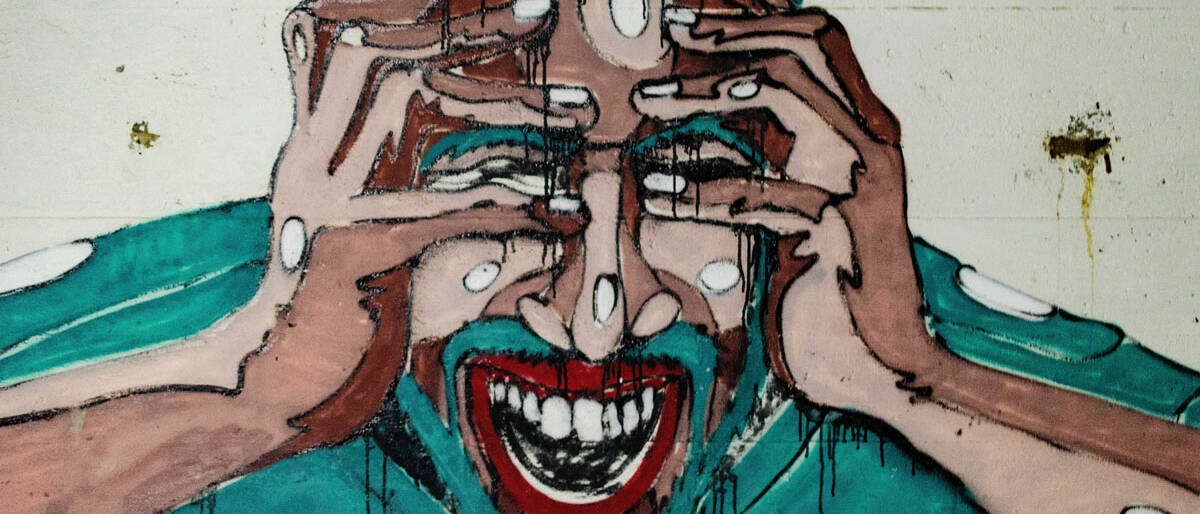
Partway through the New Yorker’s profile of leading philosopher David Benatar, there is an anecdote that sums up his ethical position neatly.
A colleague at Benatar’s university announces to the department that she is pregnant. Benatar is pushed by the colleague as to whether he is happy about the news. Benatar thinks, then replies: “I am happy,” he says. “For you.”
Benatar is a leading advocate for the philosophical school known as anti-natalism. For such thinkers, being born is a harm. As it is so cleanly put in the title of his best-known work, Benatar believes that for each of us, it would have been better for us to never have been – non-existence is preferable to existence. Benatar might be happy for his colleague, but he is not happy for the conceived child who now faces a future of pain, distress and fear.
For such a seemingly pessimistic outlook, Benatar’s arguments in favour of anti-natalism are shockingly elegant. Take, for instance, his foundational view: the asymmetry of pleasure and pain. According to Benatar, pain is bad; pleasure is good. An absence of pain is good. But an absence of pleasure is not bad for the person for whom that absence is not a deprivation.
Imagine, for instance, that one day, on a morning stroll, you encounter a branching path. You take the left road. A few metres ahead, you spot a $100 bill lying on the ground. This brings you a deep pleasure. But now let’s say that you never took the left road – that you instead veered right. In this possible world, you do not encounter the $100 bill. If you had taken the left path, you would have. But you don’t know that. You have not been promised any money; you are not aware of what you have lost. Thus, Benatar thinks, you have not been harmed.
This is the key to the anti-natalist position. The child who is never born does not know that they are missing out on the pleasures of life; there is no entity who has been deprived, because there is no entity that exists. Moreover, the child who is born might encounter these pleasures, but they will also encounter a great number of pains. For Benatar, life is a myriad of tiny, complicated discomforts, from being hungry to needing the bathroom. Not bringing a child into the world means avoiding the perpetuation of suffering, saving an entity from a long, painful life for which the only escape – suicide, death, illness – is more pain.
These views may sound, for some, deeply psychologically distressing, and Benatar acknowledges that these are not easy pills to swallow. But he believes that they are necessary truths; that they are, in a sense, inevitable conclusions to be drawn from the nature of being a conscious entity in the world.
“I think that there is something hopeless and psychologically distressing about the nature of sentient life that makes anti-natalism the correct position to hold,” he explains.
Benatar’s position has been criticised by a number of thinkers, most recently by the stoic philosopher Massimo Pigliucci, who argued against the asymmetry of pleasure and pain in a recent blog post. According to Pigliucci, pain need not be morally bad; pleasure need not be morally good. For the stoic, these are “indifferents”, their moral value neutral.
But Benatar believes that Pigliuicci has misattributed claims to him. “The asymmetry I describe is not itself a moral claim – even though it supports moral claims about the ethics of procreation,” he explains. “My claims about pain and pleasure are claims about their prudential value for the person whose pain and pleasure they are – or would be.”
“Anybody – and I am not suggesting that Professor Pigliucci is among them – who denies that pain is intrinsically bad for the person whose pain it is, and that pleasure is intrinsically good for the person whose pleasure it is, does not understand what pain and pleasure are, and how and why they arose evolutionarily. If pain does not feel bad, it is not pain. If pleasure does not feel good, it is not pleasure.”
Others still have compared Benatar’s positions to those held by ecofascists, thinkers who believe that humanity is a virus that is wreaking a havoc on the natural world, and that the only way to avoid this suffering is to force the extinction of the human race. Indeed, there is at least some overlap between ecofascist beliefs and anti-natalist ones – both argue in favour of the end of human life – but Benatar is untroubled by such a connection, for the same reason that “those of us opposed to smoking should not be troubled that the Nazis were also opposed to smoking.”
“Even though (some) anti-natalists think that humans are bad for the environment, this shows only that they agree with the ‘eco’ part of ‘ecofascism’,” Benatar explains. “Anti-natalists are not committed to the ‘fascism’ part – and should, I argue, be opposed to it.”
Benatar’s position might seem deeply cynical, even nihilistic, but there is a strange kind of hope in it too. “Part of the reason why some people may find anti-natalism unthinkable is that they cannot correctly imagine what a world without sentient life would be like,” he explains. For the anti-natalist, there is some comfort to be taken in this potential, consciousness-free world – a world without suffering, without pain, without suicide or famine or death. After all, what, paradoxically, is more optimistic than that?
David Benatar presents The Case for Not Having Children at The Festival of Dangerous Ideas 2024. Tickets on sale now.
Image by Aarón Blanco Tejedor
Ethics in your inbox.
Get the latest inspiration, intelligence, events & more.
By signing up you agree to our privacy policy
You might be interested in…
Big thinker
Politics + Human Rights, Relationships
Big Thinker: Adam Smith
Opinion + Analysis
Health + Wellbeing, Relationships, Science + Technology
How to put a price on a life – explaining Quality-Adjusted Life Years (QALY)
Explainer
Relationships
Ethics Explainer: Existentialism
Opinion + Analysis
Relationships
Will I, won’t I? How to sort out a large inheritance
BY Joseph Earp
Joseph Earp is a poet, journalist and philosophy student. He is currently undertaking his PhD at the University of Sydney, studying the work of David Hume.
Big Thinker: Plato

Plato (~428 BCE—348 BCE) is commonly considered to be one of the most influential writers in the history of philosophy.
Along with his teacher, Socrates, and student, Aristotle, Plato is among the most famous names in Western philosophy – and for good reason. He is one of the only ancient philosophers whose entire body of work has passed through history in-tact over the last 2,400 years, which has influenced an incredibly wide array of fields including ethics, epistemology, politics and mathematics.
Plato was a citizen of Athens with high status, born to an influential, aristocratic family. This led him to be well-educated in several fields – though he was also a wrestler!
Influences and writing
Plato was hugely influenced by his teacher, Socrates. Luckily, too, because a large portion of what we know about Socrates comes from Plato’s writings. In fact, Plato dedicated an entire text, The Apology of Socrates, to giving a defense of Socrates during his trial and execution.
The vast majority of Plato’s work is written in the form of a dialogue – a running exchange between a few (often just two) people.
Socrates is frequently the main speaker in these dialogues, where he uses consistent questioning to tease out thoughts, reasons and lessons from his “interlocutors”. You might have heard this referred to as the “Socratic method”.
This method of dialogue where one person develops a conversation with another through questioning is also referred to as dialectical. This sort of dialogue is supposed to be a way to criticise someone’s reasoning by forcing them to reflect on their assumptions or implicit arguments. It’s also argued to be a method of intuition and sometimes simply to cause puzzlement in the reader because it’s unclear whether some questions are asked with a sense of irony.
Plato’s revolutionary ideas span many fields. In epistemology, he contrasts knowledge (episteme) with opinion (doxa). Interestingly, he says that knowledge is a matter of recollection rather than discovery. He is also said to be the first person to suggest a definition of knowledge as “justified true belief”.
Plato was also very vocal about politics, though many of his thoughts are difficult to attribute to him given the third person dialogue form of his writings. Regardless, he seems to have had very impactful perspectives on the importance of philosophy in politics:
“Until philosophers rule as kings or those who are now called kings and leading men genuinely and adequately philosophize, that is, until political power and philosophy entirely coincide, while the many natures who at present pursue either one exclusively are forcibly prevented from doing so, cities will have no rest from evils, … nor, I think, will the human race.”
Allegories
You might have also heard of The Allegory of the Cave. Plato reflected on the idea that most people aren’t interested in lengthy philosophical discourse and are more drawn to storytelling. The Allegory of the Cave is one of several stories that Plato created with the intent to impart moral or political questions or lessons to the reader.
The Ring of Gyges is another story of Plato’s that revolves around a ring with the ability to make the wearer invisible. A character in the Republic proposes this idea and uses it to discuss the ethical consequences of the item – namely, whether the wearer would be happy to commit injustices with the anonymity of the ring.
This kind of ethical dilemma mirrors contemporary debates about superpowers or anonymity on the internet. If we aren’t able to be held accountable, and we know it, how is that likely to change our feelings about right and wrong?
The Academy
The Academy was the first institution of higher learning in the Western world. It was founded by Plato some time after he turned 30, after inheriting the property. It was free and open to the public, at least during Plato’s time, and study there consisted of conversations and problems posed by Plato and other senior members, as well as the occasional lecture. The Academy is famously where Aristotle was educated.
After Plato’s death, the Academy continued to be led by various philosophers until it was destroyed in 86 BC during the First Mithridatic War. However, Platonism (the philosophy of Plato) continued to be taught and revived in various ways and has had a lasting impact on many areas of life continuing today.
Ethics in your inbox.
Get the latest inspiration, intelligence, events & more.
By signing up you agree to our privacy policy
You might be interested in…
Opinion + Analysis
Business + Leadership, Relationships
Workplace romances, dead or just hidden from view?
Opinion + Analysis
Health + Wellbeing, Politics + Human Rights, Relationships
There’s more than lives at stake in managing this pandemic
Opinion + Analysis
Business + Leadership, Relationships
Corporate whistleblowing: Balancing moral courage with moral responsibility
Opinion + Analysis
Relationships, Science + Technology
To see no longer means to believe: The harms and benefits of deepfake
BY The Ethics Centre
The Ethics Centre is a not-for-profit organisation developing innovative programs, services and experiences, designed to bring ethics to the centre of professional and personal life.
Meet Josh, our new Fellow asking the practical philosophical questions

Meet Josh, our new Fellow asking the practical philosophical questions
Opinion + AnalysisRelationshipsSociety + Culture
BY The Ethics Centre 21 OCT 2021
At The Ethics Centre, we firmly believe ethics is a joint effort. It’s a conversation about how we should act, live, treat others and be treated in return.
That means we need a range of people participating in the conversation. That’s why we’re excited to share that we have recently appointed Joshua Pearl as a Fellow. CFA-accredited, and with a Master of Science in Economics and Philosophy from the London School of Economics, Josh is currently a director at Pembroke Advisory. He also has extensive experience as a banking analyst, commercial advisor and political advisor – diverse perspectives that inform his writing.
To welcome him on board and introduce him to you, our community, we sat down for a brief get-to-know-you chat.
You have a background in finance, economics and government, and also completed a Master of Science in Economics and Philosophy – what attracted you to the field of philosophy?
I had always read a lot of political philosophy but when I first worked as a political advisor, it really dawned on me how little I actually knew. I figured what better way to learn more than by studying philosophy at the London School of Economics and Political Science.
Tell us a little bit about your background in finance, and how that shapes your approach to philosophy.
My undergraduate degree was in economics and finance and my first job out of university was with an investment bank. Later on, I worked for an infrastructure development and investment firm. I’ve really enjoyed my professional experience, especially later in my career, though there were times early on when I questioned whether I was sufficiently contributing to society. And in truth, I probably wasn’t.
One way working in finance has helped the way I think about philosophy is that finance is practical. It’s a vocation. So when I think about philosophy I try to answer the “so what” questions. Why should we care about a certain issue? What are the practical implications?
In the context of finance, there are so many practical philosophical questions worth asking. What harm am I responsible for as an investor in a company that manufactures or owns poker machines? Should shareholders be advocating for corporate and regulatory change to help combat climate change? What are the implications of a misalignment between my investments and my personal values? And in the context of economics, philosophical questions are everywhere. What does a fair taxation system look like? How are markets equitable? Is it a problem that central bank policies increase social inequality?
These are super interesting issues (or at least I think so!) that have practical implications.
You mentioned you worked in government as a political advisor – what did you take out of that experience?
It was an amazing experience in so many ways. It was fantastic to work with really interesting people from a variety of backgrounds and have the opportunity to meet so many different members of the community, whom I wouldn’t normally have the opportunity to meet. I also felt very lucky to work for a woman whom I have a lot of respect for. Someone from a non-traditional background who has not only been very successful in her political career but has also contributed to society in a really positive way.
One of my biggest learnings from the experience was how important it is to try and consider issues from a range of multiple perspectives, with the hope of getting closer to some objective view. As part of this process, you realise the legitimate plurality of views that exist and the intellectual and moral uncertainty associated with your own views.
Do you have a favourite philosopher or thinker?
Thomas Nagel is a rockstar. He is in his eighties now and is still teaching at New York University. He is a really clear thinker whose writing is accessible and entertaining, and he isn’t afraid to challenge the orthodox views of society, including in areas such as science, religion and economics.
Nagel is a prolific writer who has undertaken philosophical inquiries across a range of fields such as taxation (the Myth of Ownership), evolution (Mind and Cosmos), and epistemology and ethics (The View from Nowhere). His most famous piece is probably What is it like to be a bat?, a journal article that is a must read for anyone interested in human consciousness.
If I could add a reasonably close second it would be Toby Ord. Ord is a young Australian whose work has already had huge real-world impacts in effective altruism (how can philanthropy be most effective) and the way society thinks about existential human risks. His recent book, The Precipice, was published in 2019 and analysed risks such as comet collisions with Earth, unaligned artificial intelligence and pandemics…
Covid restrictions have of course played havoc on the economy and our personal lives in the past 18 months – how have you been coping personally with lockdowns?
I arrived back in Australia on the very day mandatory hotel quarantine was introduced, so in some sense, everything since then has been a breeze! But to be honest, lockdown hasn’t affected me that much and I’m lucky to live with a really amazing partner. Over the course of lockdown, I’ve read a little more, written a little more, played tennis a little more… and spent way too much time trying to do cryptic crosswords.
Do you see any fundamental changes to our economic systems coming about as a result of the pandemic?
I don’t know that there will be fundamental changes, but I do hope there will be positive incremental changes. One is central bank policy. It seems inevitable that at some stage there will be a review of the RBA and with luck we follow the Kiwis’ lead and ask the RBA to consider how their policies inflate financial asset and house prices – the results of which add substantial risk to the financial system and increase social inequality. The second is what happens if (or perhaps when) Australia considers how to reduce the COVID fiscal debt. I am hopeful that we will consider land and inheritance taxes for reasons of fairness, rather than simply taxing people more for doing productive things like going to work.
As a consultant and Fellow of The Ethics Centre, what does a normal day look like for you?
My days are pretty structured, but the work is really variable.
My consulting focus is on issues at the intersection of finance, economics and government, such as sustainable and ethical business and investment. That might be working on an infrastructure project with an investment bank or government; undertaking a taxation system review for a not-for-profit; or working on ethical and sustainable investing frameworks and opportunities with various institutions, including with The Ethics Centre, which has been fantastic.
As a Fellow of The Ethics Centre, my primary involvement is through writing articles on public policy issues, with the aim of teasing out the relevant philosophical components. Questioning purpose, meaning and morality is part of being human. And it is also something we all do, all of the time. Yet there are very few forums to engage on these topics in a constructive and meaningful way. The Ethics Centre provides a forum to have these conversations and debates, and does so outside of any particular political, corporate or media lens. I think this is a huge contribution that really strengthens the Australian social fabric, so I feel really lucky to be involved with The Ethics Centre community.
Lastly, the big one – what does ethics mean to you?
That certainly is the big one! I tend to think about ethics on both a personal and social basis.
On a personal basis, to me, ethics is about determining how best to live your life, informed by such things as your family’s values, social norms, logic and religion. Determining your “ideal life” so to speak. It is then about the decisions made in trying to achieve that ideal, failing to achieve that ideal, and then trying again.
On a social basis, to me, a large part of ethics is the fairness of our social institutions. Our political institutions, legal frameworks, economic systems and corporate structures, as examples. Pretty cool areas, I think.
Ethics in your inbox.
Get the latest inspiration, intelligence, events & more.
By signing up you agree to our privacy policy
You might be interested in…
Opinion + Analysis
Politics + Human Rights, Society + Culture
Education is more than an employment outcome
Opinion + Analysis
Health + Wellbeing, Relationships
Are there any powerful swear words left?
Big thinker
Relationships
Big Thinker: Immanuel Kant
Opinion + Analysis
Business + Leadership, Politics + Human Rights, Relationships
It’s time to increase racial literacy within our organisations
BY The Ethics Centre
The Ethics Centre is a not-for-profit organisation developing innovative programs, services and experiences, designed to bring ethics to the centre of professional and personal life.
Paralympian pay vs. Olympian pay

Paralympian pay vs. Olympian pay
Opinion + AnalysisRelationships
BY Mehhma Malhi The Ethics Centre 27 SEP 2021
Recently, the Australian Prime Minister, Scott Morrison, announced that Paralympians will be paid the same bonuses as Olympians.
Specifically, medalists that win gold will receive a $20,000 bonus, and those that win a silver or bronze will get $15,000, and $10,000 respectively. Remarkably, prior to this announcement Paralympians received no payment whatsoever for representing their country and for their incredible efforts.
In his speech, Morrison noted that the Paralympic team won a phenomenal 60 medals and described this achievement as having “national significance.” It appears that the exceptional performance of our Paralympians has prompted this change to the funding model. But while this is a welcome development and clearly a step in the right direction, the reasons for this shift in thinking and change in policy warrant further consideration.
Firstly, it seems unfair and perhaps reductive to award the Paralympic team equal compensation only if they perform exceptionally as a collective. The team only garnered support for its campaign because it won a large number of medals that surpassed the collective achievements of our Olympians. One can’t help wondering had they not done so well would the Government have recognised their achievements and made this change?
On the other hand, this cannot be the only reason for the change in position as no such bonuses were considered in 2016 when Paralympians won even more medals – 81 in total. Therefore, perhaps the decision reflects more the thinking of the incumbent government instead of a more pervasive bias?
Either way, it is evident that such stark differences in pay partly occur because of deep-seated discrimination and that in reality individuals in minority groups have to go the extra mile to ‘prove’ their worth. Additionally, whilst our Olympians and Paralympians compete for their country, there is an explicit recognition that their individual efforts are partly compensated by the monetary award. The lack of payment undermines this.
Curiously, the Australian Government sets aside more than $50 million for high-performance grants that support both Olympians and Paralympians. But the fact that this budget is shared makes it even harder to comprehend why it has taken so long to recognise this disparity and attempt to correct it. However, leaving aside for a moment the reasons why this has occurred, let’s consider what makes this form of pay discrimination inequitable from an ethical perspective. Broadly, there are two main reasons.
First, the pay bonus is not an additional sum of money that athletes receive on top of their salary. Instead, it is usually their primary source of income. In other words, it is not a bonus at all, and athletes that don’t receive any such grants or awards must rely heavily on family support or sponsorships following sporting events to sustain themselves. Therefore, in addition to being an ‘award’ that serves the purpose of providing open acknowledgement of achievement, the bonus is in fact a monetary necessity. Therefore, for Australia to preferentially award athletes competing in the Olympics suggests that Paralympians are regarded less favourably and may in some way be considered as less worthy.
If the difference arose purely due to insufficient funds and a limited budget, then the most equitable approach would be to share the bonuses and split them equally between the two groups of athletes. But this has clearly not been the stance adopted to date.
Instead, the bonuses are a clear example of pay discrimination and the marked inequity denies the Paralympians what they rightly deserve. After all, the Paralympians train and work just as hard as Olympians. Furthermore, finding appropriate training facilities and resources for athletes with disabilities is far more challenging and costly than it is for those without any limitations. Places with the necessary specialised equipment and ease of access are scarce. And so, if anything, the budget for the Paralympic committee should be larger not smaller.
Further, Paralympic athletes are subject to pay discrimination as they are denied chances to receive sponsorships. There ought to be additional enhancements put in place to ensure the success of Paralympians. Traditionally, the Paralympics have been broadcast at odd hours and the advertising leading up to them is comparatively modest. This is in part driven by a lack of advertising and compounded by broadcasting schedules and limited Paralympian visibility. This means that sponsors are less likely to partner with Paralympians and the majority never receive lucrative sponsorships that would not only help the promotion of them as a brand but also contribute directly and meaningfully to their finances.
For all these reasons, it is necessary that the government, advertising agencies, and Paralympic and Olympic committees examine these issues and devise means of alleviating the financial stress placed upon athletes. Currently, athletes who want to compete and succeed in their sports have no choice but to accept rewards that are below par. The most important reason however, as to why these issues need to be addressed is that the differential treatment of Paralympians perhaps undermines the core tenet of amateur sport – that competition should fair and open to everyone equally.
Paralympians should not be penalised just because they have a strong desire to represent their country and compete. The creation of the Paralympics was based on the need for equal opportunity – surely this should be reflected in how we recognise those that show courage in participation and excel.
Image credit: Nick Miller, Paralympics, London 2012
Ethics in your inbox.
Get the latest inspiration, intelligence, events & more.
By signing up you agree to our privacy policy
You might be interested in…
Opinion + Analysis
Health + Wellbeing, Relationships
Anzac Day: militarism and masculinity don’t mix well in modern Australia
Opinion + Analysis
Relationships
Why have an age discrimination commissioner?
Opinion + Analysis
Relationships
Ask an ethicist: How do I get through Christmas without arguing with my family about politics?
Opinion + Analysis
Business + Leadership, Relationships, Science + Technology, Society + Culture
Who does work make you? Severance and the etiquette of labour
BY Mehhma Malhi
Mehhma recently graduated from NYU having majored in Philosophy and minoring in Politics, Bioethics, and Art. She is now continuing her study at Columbia University and pursuing a Masters of Science in Bioethics. She is interested in refocusing the news to discuss why and how people form their personal opinions.
BY The Ethics Centre
The Ethics Centre is a not-for-profit organisation developing innovative programs, services and experiences, designed to bring ethics to the centre of professional and personal life.
Violent porn denies women’s human rights

Violent porn denies women’s human rights
Opinion + AnalysisRelationships
BY Caitlin Roper The Ethics Centre 20 SEP 2021
In a piece published here earlier this month, ethics teacher Georgia Fagan argued that violent pornography was not incompatible with feminism – that it could even be a ‘feminist choice’ compatible with ‘gender equality’. Naturally those of us who have engaged in this field for many years did a double-take.
Fagan argues that feminist efforts to dismantle the pornography industry deny the rights of female performers to “use their naked bodies for profit”. She claims such content represents a “celebration” of “emancipated female sexuality”.
The notion that violent pornography can be ‘feminist’ is evidence of one of two assumptions; that filmed acts of male violence against women for men’s sexual gratification can be a feminist endeavour, or that the violence done to women in the production of pornography does not count as violence. As feminist legal scholar Catharine MacKinnon noted, pornography is a record of men’s violence against women. It is not fantasy, not speech, but acted out on the bodies of real women who are directly used to produce it – “what pornography does, it does in the real world”.
Mainstream pornography is the graphic, sexualised depiction of male dominance and female subordination. It eroticises men’s violence, aggression, cruelty, degradation and humiliation of women. It is hate speech, anti-woman propaganda and sexual terrorism against women. It dehumanises women as sexual objects existing wholly for men’s sexual use and abuse, as whores who love to be fucked, a set of hands and holes, as “cumdumpsters”. As such, feminists have argued that pornography – particularly, violent pornography – is at odds with women’s dignity, humanity and human rights.
Research bears this out. A 2010 content analysis of popular porn videos found that 88.2% of scenes contained physical aggression, and that perpetrators were usually male and the targets of their aggression overwhelmingly female. Research has also found pornography consumption is statistically significantly correlated with physical abuse (both victimisation and perpetration), sexual abuse (both victimisation and perpetration), acceptance of rape myths and negative gender equitable attitudes.
The defence of pornography as “empowering” for women is rooted in liberal ‘choice’ feminism, which is centred around individual empowerment rather than challenging power structures that harm women collectively. There is no recognition of women as a sex-class, with a shared condition or experience of oppression, and no acknowledgement of the social constraints under which women make choices. Rather than a collective movement to liberate women as a whole from oppression, ‘choice’ feminism serves to justify women’s participation in harmful and misogynistic practices at the expense of women as a class.
But focusing on individual women and their consent to male violence and abuse invisibilises those who perpetrate, produce, profit from and take pleasure in viewing it – men.
The reality is many women are seriously harmed in the production of pornography. They report experiencing violence and rape (as Stoya, the porn star Fagan quotes, has), coercion, exploitation, drug and alcohol abuse, trauma and suicidality. Some leave the industry after just months with irreparable damage to their bodies.
The mainstreaming and proliferation of pornography has not emancipated women and girls outside the industry who are forced to engage with men and boys who are regular consumers of it. In addition to a climate of sexual harassment, including daily requests for nudes and sexual moaning in the classroom by male classmates, young women and girls report feeling pressured to participate in painful, degrading and unwanted sex acts their male partners have seen in pornography. They report being expected to want to be choked, hit, have anal sex (coerced anal sex is rising) and to have their faces ejaculated on – the signature acts of the porn industry.
Young women have “unlimited rape stories”, documented in the thousands of accounts from Sydney students compiled by Chanel Contos. Recently at the consent roundtable she organised, domestic violence workers described the link between porn and violence against women, describing the majority of porn which depicts “aggressive, non-consensual, violent, and degrading behaviour.”
Violent pornography influences consumers’ sexual appetites, attitudes and practices and women and girls are paying the price – some even with their lives. A 2019 study from Indiana School of Public Health found that nearly a quarter of women in the US have felt scared during sex, having been choked without warning by their male sexual partners. UK-based campaign We Can’t Consent To This has documented at least 60 cases so far where women have been killed by men who have claimed it was due to “rough sex” or a “sex game gone wrong”.
While we support sexual consent education as a possible solution, better education around consent will have limited success when boys are being raised on and regularly masturbating to violent and misogynist pornography depicting women enjoying being degraded and brutalised.
“Either it is ethical and honourable to ‘play with’ and promote the dynamics of humiliation and violence that terrorise, maim and kill women daily, or it is not.”
As feminist researcher Rebecca Whisnant wrote of so-called feminist pornography, “Either it is ethical and honourable to ‘play with’ and promote the dynamics of humiliation and violence that terrorise, maim and kill women daily, or it is not.”
Violent pornography is the filmed abuse of women, and as such, both the production and consumption of it are fundamentally at odds with women’s human rights. It can only be defended if we accept that men’s sexual gratification is more valuable than women’s humanity.
Ethics in your inbox.
Get the latest inspiration, intelligence, events & more.
By signing up you agree to our privacy policy
You might be interested in…
Explainer
Politics + Human Rights, Relationships
Ethics Explainer: Gender
Opinion + Analysis
Health + Wellbeing, Relationships, Science + Technology
When do we dumb down smart tech?
Opinion + Analysis
Politics + Human Rights, Relationships
Standing up against discrimination
Explainer
Relationships
Ethics Explainer: Ethics of Care
BY The Ethics Centre
The Ethics Centre is a not-for-profit organisation developing innovative programs, services and experiences, designed to bring ethics to the centre of professional and personal life.
Ethics Explainer: Blame

In an age of ubiquitous media coverage on anything and everything, most people see blaming behaviour every day. But what exactly is blame? How do we do it? Why do we do it?
During the 2019-20 bushfires, the Prime Minister Scott Morrison was blamed for taking a vacation during an environmental crisis. During a peak in the Black Lives Matter movement in 2020, protestors in Australia blamed individual police and the government at large for the historical and present violent mistreatment of First Nations people.
Maybe you still blame your overly angry high school teacher for making you an anxious person. Maybe you blamed your co-worker recently for standing you up on your weekly Zoom call.
Whatever the stakes, we are all familiar with blaming, but could you explain what it is?
At a very basic level, blame is considered a negative reaction that we have towards someone we perceive as having broken a moral norm, leaving us feeling wronged.
There are several theories of blame that explore different interpretations of how exactly it works, but an overarching distinction is that of how or whether it’s communicated.
On the one hand, we have communicative blame – this is the outward behaviour that indicates one person blames another for something. When we yell at someone for running a red light, scold a politician on social media, or tell someone we are disappointed with their actions, we are communicating blame. Sometimes blame can even be communicated subtly, in the small ways we speak or act.
Some people think that it’s necessary for blame to be communicated – that blame without this overt aspect isn’t quite blame. On the other hand, some people think that there can be internal blame, where a person never outwardly acknowledges that they blame someone for something but still holds an internalised judgement and emotion or desire – imagine someone who holds a grudge against a friend who moved across the world but doesn’t speak to them anymore.
When we think about blame, we have to ask ourselves why do we blame, what does it do and when is it ok?
A common answer looks towards history and especially religion. In the Bible, for example, blame is often seen to hold us to account and discourage dissent. Blame has often been (and is still) used as a social and political indicator of what’s acceptable to citizens and/or governments.
This is more obvious when we consider communicative blame. Take for example, the way that the Australian public and news media communicated their blame of the Prime Minister during his bushfire vacation. These expressions ranged from simply showing dissatisfaction, to more complex indications of a desire for change and a serious acknowledgement of a moral failing.
And it also goes the other way. During the 2021 daily COVID-19 press conferences, various politicians have been quick to communicate their blame towards various groups of people flouting public health orders.
But is this type behaviour always okay? Is it always effective? These are the kinds of questions ethicists ask and attempt to answer when thinking at things like blame. One way to think about these questions is to look at them through different ethical frameworks.
Consequentialism tells us to pay attention to the outcomes of our actions, dispositions, attitudes, etc. A consequentialist might argue that we shouldn’t communicate blame if it would cause worse consequences than if we kept it to ourselves.
For example, if a child does something wrong, a consequentialist might say that sometimes it’s better to not outwardly blame them and instead do something else. Perhaps give them the tools to fix the mistake or praise them for a different aspect of the situation that they did well.
Less intuitively, though, is the implication that sometimes it will be wrong to blame someone for something, even if they deserve it! Say you have a friend who is very contrarian and does the wrong thing on purpose to get attention. Some consequentialists might say that it is wrong to communicate blame to them because under these circumstances you’re encouraging the behaviour, since they want the attention of being blamed. This might be a frustrating conclusion for people who think others get what they deserve by being blamed.
A deontologist might help them here and say that if someone is blameworthy then they deserve to be blamed and it is our duty to blame them, regardless of the consequences. Some deontologists might say that as long as our intentions are good, then we have a responsibility to blame wrongdoers and show them their moral failing.
Some different issues arise with that. Does this mean we are obligated to blame someone who “deserves it”? What about in situations where blaming would have really bad consequences? Is it still our duty to blame them for their wrongdoing?
Next time you go to blame someone, think about your intentions and what you are hoping to achieve by taking that action. It might be that you’re better off keeping it to yourself or finding a more positive way to frame the situation. Maybe the best consequences are to be gained by blaming or maybe you do just deserve to get that frustration off your chest.
Ethics in your inbox.
Get the latest inspiration, intelligence, events & more.
By signing up you agree to our privacy policy
You might be interested in…
Explainer
Relationships
Ethics Explainer: Pragmatism
Explainer
Relationships
Ethics explainer: The principle of charity
Opinion + Analysis
Science + Technology, Relationships
Love and the machine
Explainer
Relationships


